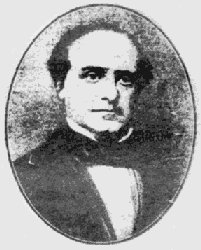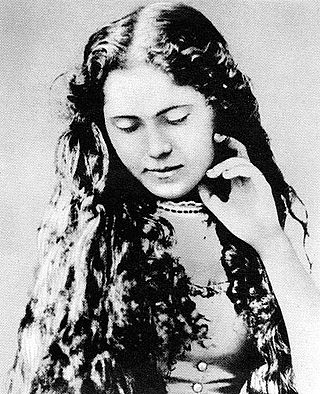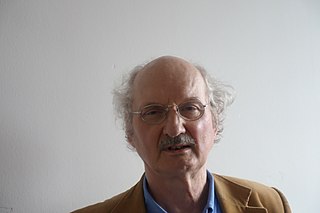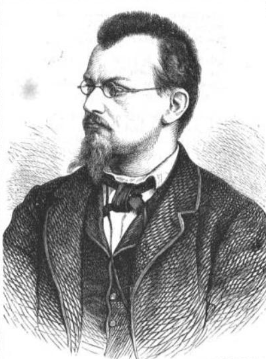
Ernest Charles Jones was an English poet, novelist and Chartist. Dorothy Thompson points out that Jones was born into the landed gentry, became a barrister, and left a large documentary record. "He is the best-remembered of the Chartist leaders, among the pioneers of the modern Labour movement, and a friend of both Marx and Engels."

Johanna Bertha Julie Jenny Edle von Westphalen was a German theatre critic and political activist. She married the philosopher and political economist Karl Marx in 1843.

Louis Kugelmann, or Ludwig Kugelmann, was a German gynecologist, social democratic thinker and activist, and confidant of Marx and Engels.

Jenny Laura Marx was a socialist activist. The second daughter of Karl Marx and Jenny von Westphalen, she married revolutionary writer Paul Lafargue in 1868. The two committed suicide together in 1911.
"Wage Labour and Capital" was an 1847 lecture by the critic of political economy and philosopher Karl Marx, first published as articles in the Neue Rheinische Zeitung in April 1849. It is widely considered the precursor to Marx’s influential treatise Das Kapital. It is commonly paired with Marx's 1865 lecture Value, Price and Profit. Previously, Marx had been studying political economy; evidence of this being his unpublished Economic and Philosophic Manuscripts of 1844 and The Poverty of Philosophy in France in 1847.

Heinrich Fink was a German theologian, university professor and politician. In 1991 Fink was dismissed from Humboldt University of Berlin due to allegations against him being a former informer for the East German state security office, the Stasi. Fink denied the allegations.
Neue Marx-Lektüre or NML is a revival and interpretation of Karl Marx's critique of political economy, which originated during the mid-1960s in both Western and Eastern Europe and opposed both Marxist–Leninist and social democratic interpretations of Marx. Neue Marx-Lektüre covers a loose group of authors primarily from German-speaking countries who reject certain historicizing and empiricist interpretations of Marx's analysis of economic forms, many of which are argued to spring from Friedrich Engels role in the early Marxist workers' movement.

Eugen Oswald, was a German journalist, translator, teacher and philologist who participated in the German revolutions of 1848–49.
August Hermann Ewerbeck, known by his middle name of Hermann, was a pioneer socialist political activist, writer, and translator. A physician by vocation and a German by birth, Ewerbeck is best remembered as an early political associate of Karl Marx and Friedrich Engels, as a leader of the Parisian communities of the utopian socialist organization, League of the Just, and as the translator of the French writings of Étienne Cabet and Ludwig Feuerbach into German.

Michael R. Krätke has studied economics, sociology and political science at the Free University Berlin, worked as Assistant professor of sociology at the Free University Berlin and at the University of Bielefeld, in 1981 he became Associate professor of political economy at the University of Amsterdam, was professor for sociology, chair of political economy and director of the Institute for Advanced Studies at Lancaster University. Since 1978, he has been an editor of the German scholarly journal spw – Zeitschrift für sozialistische Politik und Wirtschaft.

The German Ideology, also known as A Critique of the German Ideology, is a set of manuscripts written by Karl Marx and Friedrich Engels around April or early May 1846. Marx and Engels did not find a publisher, but the work was retrieved and first published in 1932 by the Soviet Union's Marx–Engels–Lenin Institute. The book uses satirical polemics to critique modern German philosophy, particularly that of young Hegelians such as Marx's former mentor Bruno Bauer, Ludwig Feuerbach, and Max Stirner's The Ego and Its Own. It criticizes "ideology" as a form of "historical idealism", as opposed to Marx's historical materialism. The first part of Volume I also examines the division of labor and Marx's theory of human nature, on which he states that humans "distinguish themselves from animals as soon as they begin to produce their means of subsistence".
Value criticism is a social theory which draws its foundation from the Marxian tradition and criticizes the contemporary mode of production. Value criticism was developed partly by critical readings of the traditions of the Frankfurt School and critical theory. Prominent adherents of value criticism include Robert Kurz, Moishe Postone and Jean-Marie Vincent.

Marx-Engels-Gesamtausgabe (MEGA) is the largest collection of the writing of Karl Marx and Friedrich Engels in any language. It is an ongoing project intended to produce a critical edition of the complete works of Marx and Engels that reproduces the extant writings of both authors in books of high-quality paper and library binding.

Capital: A Critique of Political Economy, also known as Capital and Das Kapital, is a foundational theoretical text in materialist philosophy and critique of political economy written by Karl Marx, published as three volumes in 1867, 1885, and 1894. The culmination of his life's work, the text contains Marx's analysis of capitalism, to which he sought to apply his theory of historical materialism "to lay bare the economic law of motion of modern society", following from classical political economists such as Adam Smith and David Ricardo. The text's second and third volumes were completed from Marx's notes after his death and published by his colleague Friedrich Engels. Das Kapital is the most cited book in the social sciences published before 1950.
Horst Bartel was a German historian and university professor. He was involved in most of the core historiography projects undertaken in the German Democratic Republic (1949–1989). His work on the nineteenth-century German Labour movement places him firmly in the mainstream tradition of Marxist–Leninist historical interpretation.
Gerson Georg Trier was a Danish social democrat, journalist, language teacher and translator.

Michael Heinrich is a German historian of philosophy and political scientist, specialising in the critical study of the development of Karl Marx's thought. Heinrich's work, influenced by Elmar Altvater and the Neue Marx-Lektüre of Hans-Georg Backhaus and Helmut Reichelt is characterised by its focus on the points of ambivalence and inconsistency in the work of Marx. Through this theme, Heinrich challenges both the closed system he identifies with "worldview Marxism", as well as teleological narratives of Marx's intellectual development throughout his life. He is best known for his 1991 study of the theoretical field of classical political economy The Science of Value, his introductory text to the critique of political economy An Introduction to the Three Volumes of Karl Marx's Capital, and his ongoing project to produce a multi-volume biography of Marx, of which the first volume of a projected four was published in 2020.
Adolf Friedrich Rutenberg was a German geography teacher, Young Hegelian and journalist. He was a close friend of German philosophers Karl Marx and Max Stirner. He was alongside Bruno Bauer as one of two reported mourners at Stirner's graveside.
Ingo Stützle is a German political scientist.

Abraham Peter Carl Siebel was a German merchant, poet, and friend of Karl Marx and Friedrich Engels. His pseudonyms were Emil Thilva and Julius Morton.











